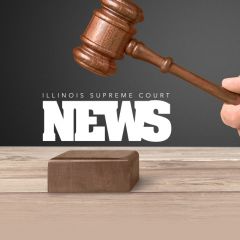In his May Illinois Bar Journal Article, “FOID Where Prohibited,” Jake Crabbs addresses the intersection of two trends of 2020: 1) a tremendous jump in gun ownership; and 2) the anecdotal rise of domestic violence during shelter-in-place conditions. These two trends intersect in the provisions of the Illinois Domestic Violence Act of 1986 and the Firearm Owners Identification (FOID) Card Act. Prosecutors, criminal defense attorneys, family law practitioners, and gun owners should all be aware of the ways these statutes interrelate and the constitutional issues that may arise whenever an order of protection is entered against a FOID cardholder. These concurrent trends may eventually lead to an increase in the total number of petitions for orders of protection against respondents who have FOID cards, Crabb writes, especially when circuit courts finally return to full capacity. This is not to suggest that FOID cardholders are more likely to commit domestic violence, per se; it is simply a plausible result of the two unrelated trends. And when it comes to orders of protection against FOID cardholders, Crabb argues, there is a significant—and constitutionally infirm—gap in the governing statutes.
ISBA members, sign up to receive The Bar News' biweekly e-newsletter by emailing emailpreferences@isba.org
-
May 17, 2021 | Practice News

-
May 17, 2021 | Practice News
 Illinois Court Help was launched today in order to connect people to the resources and information they need to go to court in Illinois. It is the first personalized court information service offered by the Illinois courts and one of the latest innovations created during the COVID-19 pandemic to make the courts and information more accessible.
Illinois Court Help was launched today in order to connect people to the resources and information they need to go to court in Illinois. It is the first personalized court information service offered by the Illinois courts and one of the latest innovations created during the COVID-19 pandemic to make the courts and information more accessible. -
May 13, 2021 | CLE
 Have you, your family, or any of your clients been the target of fraud? Then don’t miss this in-depth look at the types of scams and fraud that your clients may encounter and how you can effectively advise them during this stressful time. The program takes place from noon until 1 p.m. on Wednesday, May 19. Attorneys with basic to intermediate practice experience who are interested in learning how to help clients who might be facing this dilemma will better understand the warning signs of suspected scams, the do’s and don’ts to prevent fraud, and the resources that are available for advocates, service members, and veterans.
Have you, your family, or any of your clients been the target of fraud? Then don’t miss this in-depth look at the types of scams and fraud that your clients may encounter and how you can effectively advise them during this stressful time. The program takes place from noon until 1 p.m. on Wednesday, May 19. Attorneys with basic to intermediate practice experience who are interested in learning how to help clients who might be facing this dilemma will better understand the warning signs of suspected scams, the do’s and don’ts to prevent fraud, and the resources that are available for advocates, service members, and veterans. -
May 12, 2021 | CLE
 Don’t miss this panel presentation from 11 a.m. until 1 p.m. on Thursday, May 27, that gives you the updates you need to advise your clients on a number of lien issues, including ERISA liens, healthcare provider liens, health insurance subrogation liens, Medicare and Medicaid liens, and more. Attorneys with basic practice experience who attend this online seminar will better understand: the common fund doctrine; the current liens statutes; how reducing liens equals greater success for clients and a quicker resolution to cases; and how to successfully adjudicate liens in court.
Don’t miss this panel presentation from 11 a.m. until 1 p.m. on Thursday, May 27, that gives you the updates you need to advise your clients on a number of lien issues, including ERISA liens, healthcare provider liens, health insurance subrogation liens, Medicare and Medicaid liens, and more. Attorneys with basic practice experience who attend this online seminar will better understand: the common fund doctrine; the current liens statutes; how reducing liens equals greater success for clients and a quicker resolution to cases; and how to successfully adjudicate liens in court. -
May 11, 2021 |
Member Services
The Illinois State Bar Association’s Lawyer Finder Service provides referrals to local lawyers Mondays through Fridays. The Service makes referrals in a number of areas of law. For the month of April 2021 there were more than 400 referrals given. Here are the results for April 2021:
-
May 10, 2021 | Practice News
 Chief Justice Anne M. Burke of the Illinois Supreme Court will preside over a ceremony to administer the attorney’s oath to 271 new attorneys on Thursday, May 13, at 2 p.m. via live video broadcast. This bar admission ceremony is for all certified candidates who have passed the February 2021 bar exam.
Chief Justice Anne M. Burke of the Illinois Supreme Court will preside over a ceremony to administer the attorney’s oath to 271 new attorneys on Thursday, May 13, at 2 p.m. via live video broadcast. This bar admission ceremony is for all certified candidates who have passed the February 2021 bar exam. -
May 10, 2021 | Practice News
 As Susan Bart demonstrates in her May 2021 Illinois Bar Journal article, “Who Are My Qualified Beneficiaries?,” it is essential to determine the qualified beneficiaries of an irrevocable trust under the Illinois Trust Code (ITC). Qualified beneficiaries have rights to receive notices of the existence of the trust and certain events, information about the trust, and accounts. But qualified beneficiaries may also be necessary parties to certain actions, such as a nonjudicial settlement agreement. A trustee who fails to correctly identify qualified beneficiaries, Bart notes, may breach her or his duties to provide information to qualified beneficiaries, or may provide information to beneficiaries who are not required to receive it. The Uniform Trust Code (UTC), upon which the ITC was based, uses the concept of “qualified beneficiary” to limit the class of beneficiaries to whom certain notices must be given or consents received. Bart introduces several kinds of scenarios that unpack the differences between qualified beneficiaries and remote and contingent beneficiaries under the new ITC.
As Susan Bart demonstrates in her May 2021 Illinois Bar Journal article, “Who Are My Qualified Beneficiaries?,” it is essential to determine the qualified beneficiaries of an irrevocable trust under the Illinois Trust Code (ITC). Qualified beneficiaries have rights to receive notices of the existence of the trust and certain events, information about the trust, and accounts. But qualified beneficiaries may also be necessary parties to certain actions, such as a nonjudicial settlement agreement. A trustee who fails to correctly identify qualified beneficiaries, Bart notes, may breach her or his duties to provide information to qualified beneficiaries, or may provide information to beneficiaries who are not required to receive it. The Uniform Trust Code (UTC), upon which the ITC was based, uses the concept of “qualified beneficiary” to limit the class of beneficiaries to whom certain notices must be given or consents received. Bart introduces several kinds of scenarios that unpack the differences between qualified beneficiaries and remote and contingent beneficiaries under the new ITC. -
May 7, 2021 | CLE
 Get the information you need to effectively advise your service member clients regarding their employment protection rights with our online program from noon until 2 p.m. on Wednesday, May 26. Attorneys with basic to intermediate practice experience who are interested in learning more about this unique area of the law will better understand: the differences between the Uniformed Services Employment and Reemployment Rights Act (USERRA) and the Illinois Service Member Employment and Reemployment Rights Act (ISERRA); what the federal and Illinois employment rights of service members include; the requirements and limitations of service member employment rights; and the obligations of employers under USERRA and ISERRA.
Get the information you need to effectively advise your service member clients regarding their employment protection rights with our online program from noon until 2 p.m. on Wednesday, May 26. Attorneys with basic to intermediate practice experience who are interested in learning more about this unique area of the law will better understand: the differences between the Uniformed Services Employment and Reemployment Rights Act (USERRA) and the Illinois Service Member Employment and Reemployment Rights Act (ISERRA); what the federal and Illinois employment rights of service members include; the requirements and limitations of service member employment rights; and the obligations of employers under USERRA and ISERRA. -
May 5, 2021 |
Practice News
This is part one of a three-part video series on the Illinois Supreme Court’s remote access policy and e-filing developments, presented by the ISBA’s Standing Committee on Legal Technology.
-
May 4, 2021 | ISBA News
 Sonni Choi Williams has been elected Third Vice-President of the Illinois State Bar Association. Ava M. George Stewart won the Cook County seat on the Board of Governors and Amanda G. Highlander won the Area 8 seat on the Board of Governors.4 comments (Most recent May 7, 2021)
Sonni Choi Williams has been elected Third Vice-President of the Illinois State Bar Association. Ava M. George Stewart won the Cook County seat on the Board of Governors and Amanda G. Highlander won the Area 8 seat on the Board of Governors.4 comments (Most recent May 7, 2021)

